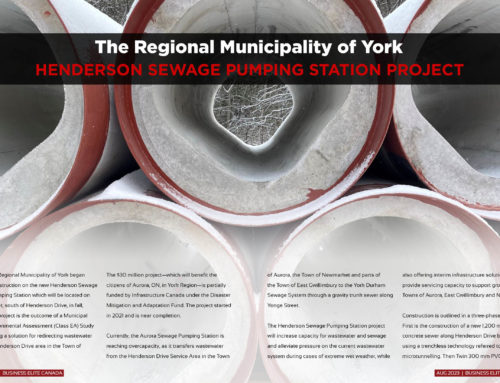Providing Safe and Clean Drinking Water
By Anna Guy
Established in 1984, the Capital Region Southwest Water Services Commission (CRSWSC) has grown as a regional co-operation to provide clean, safe drinking water to approximately 65,000 residents of seven member municipalities south of Edmonton, AB, including the City of Leduc, Leduc County, Town of Beaumont, Town of Calmar, Village of Hay Lakes, Camrose County and the Town of Millet.
The Commission purchases its water directly from EPCOR Water Services, derived from two Edmonton-based major water treatment plants and sourcing water from the North Saskatchewan River. Water is provided to the member municipalities through the CRSWSC transmission system, who then serve their customers directly. The CRSWSC closely monitors and controls flow rates, chlorine residuals, pressures and reservoir levels for each of the member municipalities and also works closely with the Regional Water Customers Group for long-range planning, rate negotiation and coordination of water supply.
The residents and businesses within the municipalities receive water from the CRSWSC, which includes approximately 120 kilometres of transmission pipeline. The Edmonton International Airport (EIA) is a large customer of Leduc County, also receiving water from the CRSWSC transmission system. In 2017, the CRSWSC provided 5,650,000 m3 of water to their member municipalities.
Chairman Rick Smith, of Leduc County, says the CRSWSC continually strives to maintain reasonable water rates while saving for future infrastructure requirements. On January 1, 2019, The City of Edmonton will annex (20,402 acres) from Leduc County, which will impact the CRSWSC’s jurisdiction. “One of the challenges the CRSWSC is currently working with is properly understanding and responding to water demand pressures in light of Edmonton’s annexation into Leduc County,” says Smith. The annexation will put substantial growth pressure on the available water supply to service the annexed area, which the Commission is actively analyzing in our Water Master Plan.”
The CRSWSC is responsible for conveying water from the City of Edmonton to the member municipalities at two times the average usage rate for the municipalities. “Each municipality is responsible to convey the flows within their municipality’s jurisdiction, and as such, the challenge for the municipalities is providing enough storage and pumping capacity to service their residents during hot dry summer days where usage is higher than water supply from the Commission,” says Smith. “Other challenges relate to planning for growth such that the Commission is ready and well-funded to expand the water supply lines to communities when the usage demands that additional infrastructure be provided.”
The CRSWSC Board Members are engaged and collaboratively work together to benefit the region and all CRSWSC members, as opposed to focussing on their specific municipalities. Says Smith, “Our Board members are prudent in identifying growth projections and planning for the future, which includes saving towards future infrastructure requirements, while balancing reasonable water rates for their customers.”
There are many examples of the CRSWSC going above and beyond to fulfill their mandate of providing clean, safe drinking water to its customers. A noteworthy example is the recent addition of the water line to the Town of Millet (2017), when the Commission facilitated the construction of the pipeline on behalf of Millet. “In 2010 the Town of Millet approached us about connecting their municipality to a reliable, treated water supply from EPCOR,” says Smith. “The Town obtained a water-for-life grant from the province of Alberta to pay for 90 per cent of the cost of extending the water supply to Millet.” To assist with interim financing between when the contractors had to be paid and when grant money was received by the Province, the CRSWSC then stepped up to manage the project and utilize its debt capacity to finance the construction of the project until the provincial grant dollars came in.
The Commission was also able to work with its members in light of the provincial funding to increase the benefit to many of its members at the same time it was providing a new water feed to the Town of Millet. The CRSWSC worked with the Town of Millet to upsize the line in specific locations to provide additional water supply to existing members. This allowed the City of Leduc and Leduc County to contribute funds to oversize the line and have a single project service the needs of three municipalities.
The City of Leduc achieved a second feed of water to their community which improved the resiliency of the community to a possible supply interruption, while Leduc County was provided with additional allocation of water for future growth. “While those members needed to pay the cost of upsizing the infrastructure, there were many efficiencies and savings as a result of building the infrastructure together (savings as a result of the scale of the project and one pipeline instead of multiple),” says Smith.
Behind infrastructure, cost, safety and financing, the CRSWSC knows all these angles will ultimately lead to an improved quality of life for those who live in their municipalities. “The members of our Board sought election because of their passion for public service,” says Smith. “We are real community builders looking for opportunities for improved safety and reliability of service.”





